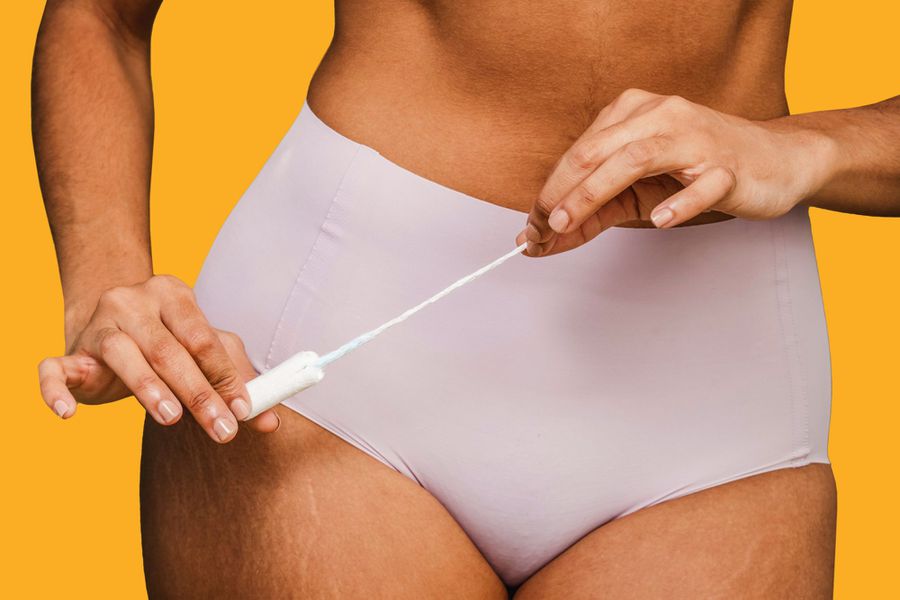
When you find an expired carton of half-and-half in the back of the fridge or an untouched tube of sunscreen in your bathroom cupboard, you probably toss them in the trash without giving it a second thought. But when you’re blessed with a surprise visit from Aunt Flo and you find a spare tampon in the gym bag you haven’t carried since last summer, is it safe to use? Or do tampons expire?
Here, Alexis May Tran Kimble, D.O. an ob-gyn and urogynecologist at The Kimble Center for Pelvic Wellness in Los Angeles, answers that very question — and shares when exactly you should refresh your stash.
So, Do Tampons Expire?
It isn’t so clear-cut. Tampons are regulated as medical devices by the U.S. Food and Drug Administration, but unlike your favorite protein bar or the ibuprofen you take to ease a headache, menstrual products aren’t required to have an expiration date listed on the packaging, says Dr. Kimble. There also aren’t any industry standards detailing the information (think: production date, a “best by” date) that needs to be included on every tampon box, she says.
So tampons don’t technically “expire. But they do have a shelf life — or the length of time that the product can perform as expected and meet quality standards when stored properly, a determined by the manufacturer, says Dr. Kimble. This doesn’t mean your tampons need to be thrown out the moment the shelf life is up, but rather they might not work as well after that period of time, according to information published on P&G’s website.
This shelf life will vary between products, largely depending on the materials used to create them. In general, however, tampons will stay in their prime condition for roughly three to five years after they were made, says Dr. Kimble. Tampax Radiant tampons, for example, have a shelf life of three years when stored in a cool, dry place, and Tampax Pearl and Cardboard varieties can last five years, according to the P&G information. (BTW, Tampax also voluntarily lists an “expiration” month and year on its tampon boxes.)
TL;DR: You don't have to rush to buy a new box when that three- to five-year shelf life is up. But if replacing your stash puts your mind at ease, there's no harm in doing so.
When Should You Replace Your Tampons?
Tampons may not truly "expire," but there is one instance in which you should definitely pick up a fresh box. "The general guideline: If the original packaging [of an individual tampon] is open, I would probably reconsider using it if you can," says Dr. Kimble. "It'll be exposed to air or moisture, things could spill on it, and all of those things could affect the quality of the tampon."
Not to mention, an open wrapper allows for harmful bacteria to potentially contaminate the tampon itself, and it can then absorb through the vagina’s mucous membranes, says Dr. Kimble. In theory, this foreign bacteria could increase the risk of irritation or another type of infection, she explains. And depending on the type of bacteria, you could ultimately develop toxic shock syndrome (TSS) — a condition caused by certain strains of bacteria that can result in liver, heart, and lung failure, according to the Cleveland Clinic.
"I would say [TSS] is the biggest health risk," says Dr. Kimble. "We don't know of any case of people using an expired tampon or one of unknown date and actually suffering from that. But if the tampon is obviously compromised, it could have a higher risk of harboring bacteria; that bacteria releases toxins, and when it's absorbed into the body, it can potentially lead to TSS, which can be very damaging." Again, there isn't any hard data showing a link between using a previously opened tampon and TSS or other health conditions, but it could be possible.
How to Properly Store Tampons
To keep your tampons in tip-top shape — and prevent any bacteria from sneaking inside them — store them in a cool, dry location, recommends Dr. Kimble. This will prevent any moisture from being absorbed, which could allow bacteria to grow, she explains. If you're dead-set on stashing them in the cupboard next to your shower, remove them from their original box and place them in an air-tight plastic or glass container, she says. While you're on the go, you'll also want to keep your tampons in their own container, such as a Stasher bag, in your tote bag to prevent the original packaging from opening.
If you're concerned about shelf life, consider buying your tampons on a monthly basis, rather than in bulk, or write the date you purchased your pack directly on the box. That way, there's no guessing how long they've been sitting in your bathroom drawer, she suggests.
Regardless of how long it’s been since you bought your tampons, if they look compromised in any way or you feel uncertain about their integrity, there’s no point in risking your health. When in doubt, just toss it out. (Next up: Can You Sleep with a Tampon In?)
